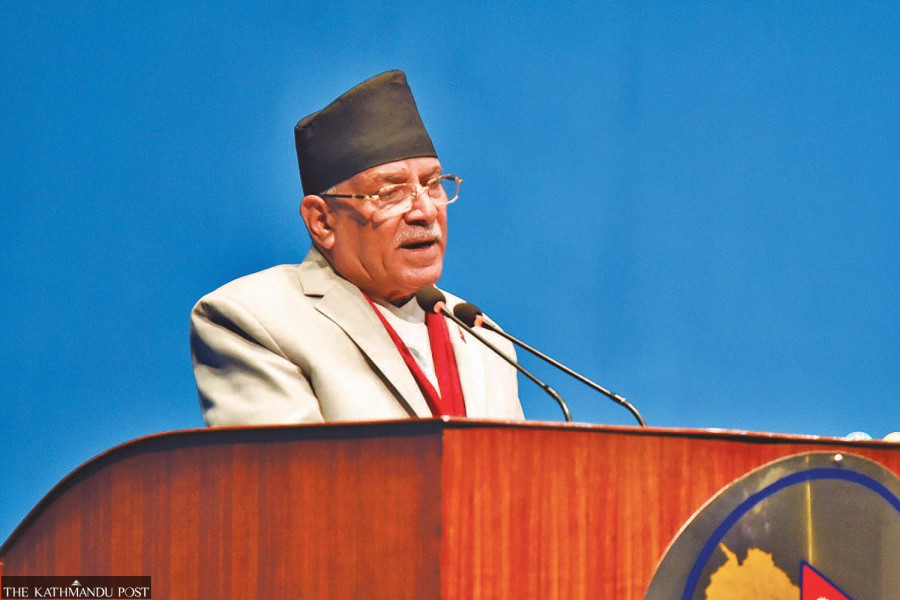Politics
Dahal attacks government but won’t burn bridges with Congress
The main opposition leader, who was prime minister at this Parliament’s start, can’t fool the two governing parties any longer, says Nepali Congress spokesperson Mahat.
Post Report
CPN (Maoist Centre) Chairman Pushpa Kamal Dahal, who is also the main opposition leader, tried to drive a wage in the ruling coalition of the Nepali Congress and the CPN-UML and made an all-out attack on the government while speaking at the House of Representatives on Thursday.
Dahal also highlighted the absence of Prime Minister KP Sharma Oli from the House meeting when he, the leader of the opposition, was speaking. To the Congress leadership, Dahal posed several questions and demanded the ruling party’s position on key issues like constitution amendment, stability of governance, recently issued ordinances, and the new social media bill, among others.
Dahal also tried to woo some leaders like Rastriya Swatantra Party chief Rabi Lamichhane and Kathmandu Metropolitan City Mayor Balendra Shah, and social activist Ashika Tamang, and objected to the way Lamichhane and Tamang were being persecuted by the authorities. Dahal alleged that the government was pursuing political vendetta against Lamichhane by needlessly taking him to the court district after district.
Congress and UML leaders were quick to counter Dahal’s statements. “It [Parliament] is not a place to vent your frustration,” said Raghuji Pant, a UML lawmaker. “One should come up with facts and evidence, not with frustration.”
Dahal also touched upon the future of the Oli government. “We are not in a race to unseat this government,” Dahal said. But he questioned why Oli and Nepali Congress President Sher Bahadur Deuba kept on saying that the government would last until the next elections and that no one could topple it.
He also tried to flatter Deuba.
“The eyes and ears of Deuba ji are very much intact and healthy,” Dahal said. “So there is no need [for Oli] to commit repeatedly that he’ll vacate the governing chair for Deuba.” He attacked the very premise of the two largest parties forming the government, calling it unnatural and unconstitutional.
“This government will crumble on its own,” Dahal said. “We will form a government on our own basis but we are not in a race for that.”
In response to Dahal’s attack on the government for issuing six different ordinances, which are yet to be endorsed by Parliament, Pant challenged Dahal to prove how these ordinances are against the government and the Nepali people.
“There is no logic, fact and evidence behind criticising these ordinances,” Pant said. “Which provisions of these ordinances harm the Nepali people, which provision attacks freedom of expression? This is Parliament, not a place to vent your ire and frustration.”
Dahal claimed that the land-related ordinance serves the interests of the land mafia.
“Not only the process, the contents of the ordinances are highly objectionable,” Dahal said. “What is the intent behind bringing the ordinance related to the Land, National Conservation and Wildlife Protection Act? The amended clause in this particular ordinance will cause more difficulties for landless people, Dalits, squatters and those who have been tilling land for a long time to obtain the land certificate.”
Dahal further said that the country was ruled by the Congress and the UML over the past 35 years, but they did not feel the need to bring such reforms in the laws in the period. “Why now and that too, by bypassing Parliament?” he asked.
Moreover, Dahal urged the government not to amend the constitution in ways that violate the historic and significant agreements made among political parties. “If we need to revise the constitution, let’s switch to a fully proportional electoral system, ensuring 50 percent women's participation and representation of Dalits based on their population and preferential rights,” he said. “Let's move toward a directly elected executive system.”
Dahal also challenged the Nepali Congress and UML to amend the provision of proportional representation and inclusiveness. He also opposed the perceived bid to institutionalise the two party systems in Nepal.
He also called for the investigation of all corruption-related cases including the financial irregularities that took place in Maoist cantonments and Shera Palace of Chitwan where the Maoist leadership is allegedly involved.
Nepali Congress spokesperson Prakash Sharan Mahat said that the two parties had come together to shake a disillusioned Dahal that he would continue as prime minister for the full five-year term of this Parliament by siding with one party or the other despite being the leader of the third largest party.
After the Congress and UML formed this government, Dahal came to know his ground reality, Mahat said. “Vented his frustration today.” Mahat, who was the finance minister when Dahal was the prime minister, said Dahal would often meddle in the Cabinet’s decisions.




 9.12°C Kathmandu
9.12°C Kathmandu














